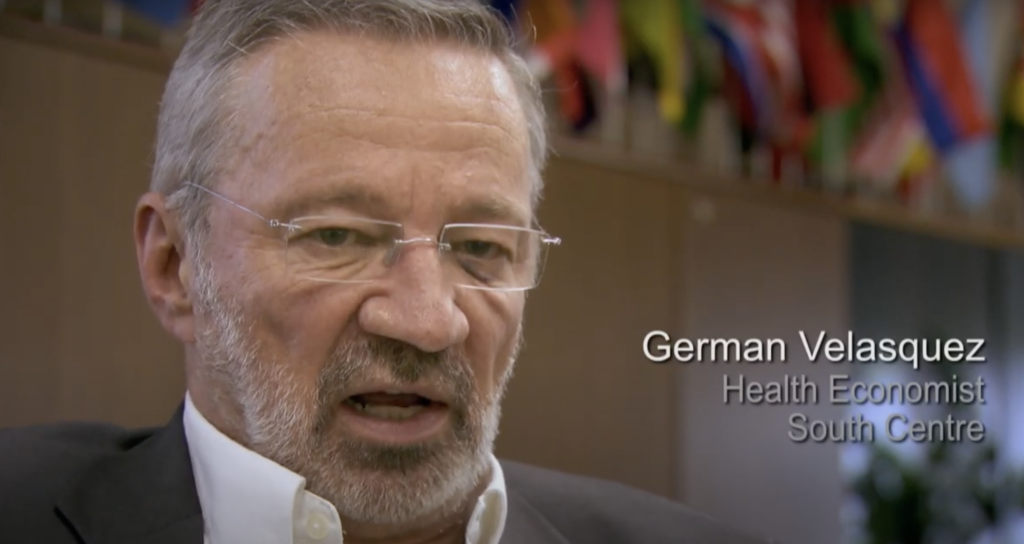
Economist Herman Velasquez directed the WHO drug action program for some time. In 2010, he left the organization after repeatedly denouncing the lack of independence in its decisions.
Velasquez’s view is that the decisions made by the World Health Organization today are fundamentally compromised. Unfortunately, the decisions made by the WHO are no longer purely technical. Increasingly, they are influenced by political, industrial, and often economic interests and agendas.
Velasquez points out how much the WHO has become an organism largely controlled by the private sector. Until seven years ago, 51% of the WHO’s budget came from public contributions by member countries. Today, over 80% of the budget comes from private contributions, sometimes public but usually for specific projects or programs. As a result, setting priorities largely escapes not only the general direction of the WHO but also the governing bodies such as the World Health Assembly and the Executive Council.
“I am now very pleased to welcome, on behalf of the Health Assembly, Mr. Bill Gates, co-chair of the Bill and Melinda Gates Foundation.”
In the spring of 2011, Bill Gates was one of the star guests at the World Health Assembly, the WHO’s legislative body where representatives of the 193 member states meet once a year. It is rare for a businessman to speak from this podium, but the Gates Foundation has become the second-largest contributor to WHO programs, just behind the U.S. government.
Bill Gates :
“I know that as a leader of a health ministry, you have a very difficult job. You face many issues, all relating to life and death. But I believe that as you set your priorities, running the immunization system will emerge as something very, very important.
Vaccines are an extremely elegant technology. They can be expensive, but they are easy to deliver and can provide lifelong protection from disease.
At Microsoft, we dreamed of powerful and simple technologies. Vaccines are such a technology, making them one of the best investments we can make.”
Gates insists that he has no influence over political decisions at the WHO. However, this is false. When Mr. Gates says, “I’ll give money to this but not that,” he is effectively defining priorities because tomorrow the WHO will only have funds to invest in certain diseases—those backed by money, such as that provided by the Gates Foundation.
Antitrust:
In January 2000, Bill Gates founded his foundation while the U.S. Department of Justice brought antitrust litigation against Microsoft. The computing giant was accused of using its monopoly position to eliminate competitors. Microsoft, the most powerful and successful company of the new age, was accused of using and abusing its power illegally.
This ruling could affect Bill Gates, the man behind Microsoft and the richest person in the world. While Gates was giving his deposition before American justice, he no longer appeared as the American hero or the computer genius but rather as an evasive man on the run.
No person and no company is above the law.
Public opinion of Bill Gates wavered, along with the stock value of Microsoft and his personal fortune.
Then, Bill Gates transformed himself into a good Samaritan. He and his wife traveled to the poorest countries on the planet, boosting both his image and that of Microsoft. Although Gates officially stepped down from his position as CEO, he remained president and the largest individual shareholder.
The man who once sought to dominate the world with his software was now crafting a new image for himself: that of the greatest philanthropist on the planet, and possibly in history.
The Gates Foundation is essentially a clone of the Rockefeller Foundation, founded in 1913 to counter the hostility of Americans and Congress toward Standard Oil, which was accused of making illegal profits, appropriating land, and especially polluting the American environment.
Back then, these giant financial corporations were called “robber barons.” Today, Gates’s foundation fits the same profile: a huge corporation no one can challenge because of its dominant position.
Currently, the only way in the U.S. to counter attacks and hostility toward such corporations is to create a prestigious foundation that is entirely philanthropic. Public health is the ideal target for this.
Today, no one remembers the lawsuit against Bill Gates. People only talk about his foundation.
He has become an idol, one of the greatest businessmen of our time—arguably the greatest of our age.
Ladies and gentlemen, I believe that someday in the future, all people, no matter where they are born, will be able to live a healthy life.
Also Read:
